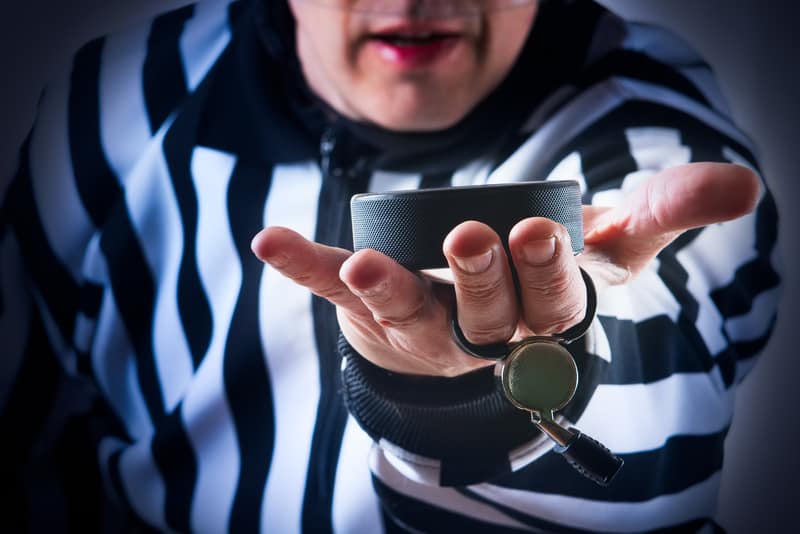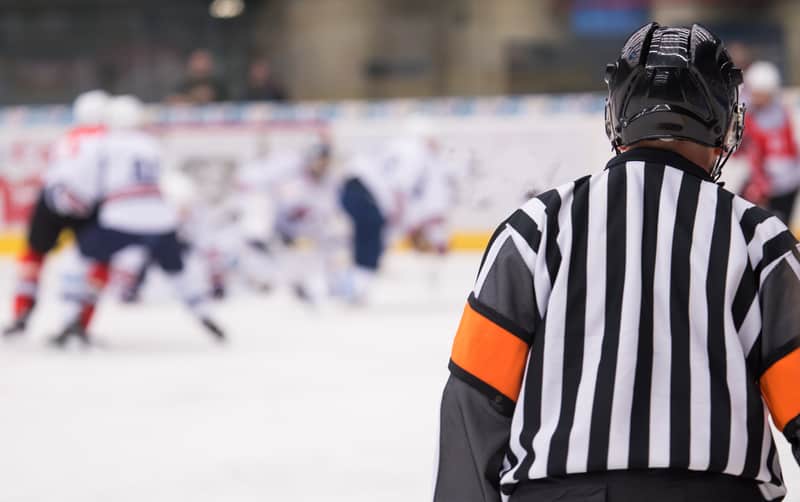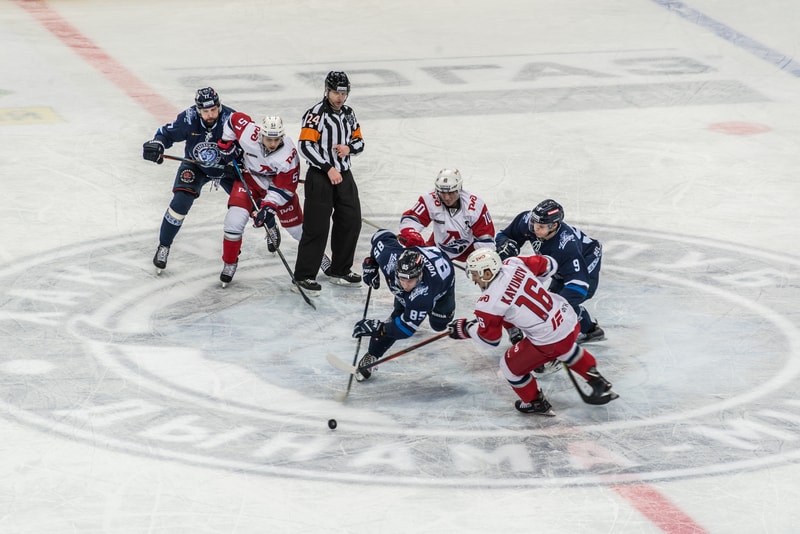
I have always wondered what its like to be a hockey official, is becoming a Referee for hockey is an easy process? Through some research I have found It does take some time and commitment to complete the initial steps.
How to become a youth hockey Referee (official):
- Contact your local association and see if there is a demand for new officials
- Make sure the game times and schedule will work for you
- Register with your countries governing body (Hockey Canada or USA Hockey
- Take the online course that is required before the in-class session
- Make sure you have completed all required training
- Attend the in-class session/seminar
- Start Officiating!
Making Sure You Are Needed
The first thing I suggest is contacting your local branch to see if there is a need for new officials. Chances are they are always looking for someone new to step into the lime light and start their referee journey.

But you never know. If you live in a small community where there aren’t many hockey teams, there might not be a big need for new refs. That being said its very easy to send a quick email to your local referee-in-chief and simply ask them whether or not there is an opening.
I contacted my districts referee-in-chief, and he said new officials are accepted each year. The clinics open up late summer to early fall. The first clinic costs $169. Now this is for my area so make sure to check the pricing in your area, so there aren’t any surprises when it comes to cost.
Will The Schedule Work
Second on the to-do list, make sure the game times and refereeing schedule in your local district are something you can work with. It would be pretty awful, if you didn’t ask this question in the beginning
Go all the way through the training
Just to find out you can’t even make the times work! DOH! *Homer S*
That is why its very important to ask this question before you commit your money and more importantly, your valuable time. We all live busy lives, whether you’re in school or have a job or volunteer other places just remember that officiating minor hockey also takes time. And lots of it.
Getting Started Online
Once you have determined there is a need for refs in your area, the games times and schedules will work for you. The next step, in most cases, is to create an online account with your countries governing body. For me it is Hockey Canada, that link will take you to a contact page where you can find the district where you live and the contact info for the Member Branch Officiating Contacts (Referee-In-Chief).
If I get accepted by my local branch, the program I will be going through is a three step process. First you complete an online training program through Hockey University. Second you complete an in-person clinic to get certified along with a national exam. Third is a one (1) hour on ice session to test your practical skills.
Here is the USA Hockey link to register as a player, coach, referee or volunteer. Just follow the instructions and you are well on you way to any one of those options. It is very simple to create an account and get started as with anything online you are walked right through the process of registering.
From what I have researched, in the USA its is very similar with a couple extra steps. Here is a list of what to expect
- Register with your local RIC (Referee-in-Chief)
- Register with USA Hockey Membership (same as above incase you missed it)
- Complete United States Olympic Committee SafeSport (online training)
- Online Video Modules that teach officiating fundamentals.
- Open Book Exam on Playing Rules (designed to be completed at your own pace)
- Classroom Seminar
Levels of Officiating

There are 6 levels of officiating in Canada. Lets look at the levels and a bit of info on each.
Level I (one)
To be certified at Level I you will need to attend and complete the Level I clinic. This can be done in a minimum of 8 hours, typically on a Saturday and/or Sunday or in two evenings.
Some officiating branches require a national exam to be taken before the clinic is completed. Once completed you will receive a certificate and card indicating your completion information.
There are over 13,000 Level I officials registered each year. Age limits can be set by individual branches. As a Level I official you will be able to officiate some minor hockey levels.
Level II (two)
To complete Level II certification, an individual must me at least sixteen (16) years old. They will have to attend and participate in all clinic sessions. Same as Level I, this will take a minimum of 8 hours and can be completed over two evenings or on a Saturday or Sunday.
In this Level, there is a national exam. The participant must score a 70% or higher that will be marked before the clinic is over. Along with the written exam, there is a practical on-ice evaluation.
A qualified Branch Hockey Canada Officiating Program Supervisor will evaluate the on-ice portion of this Level. Once the clinic, exam and on-ice evaluation have been successfully completed, the participant will get a Level II sticker to put on their Level I certificate and a card.
If you are seventeen (17) years or older, based on your ability, you can complete Level I and Level II in the same year. This is the only time you can complete two levels in one season. The reason for this is to encourage people that may have playing or coaching experience to consider becoming a referee.
According to Hockey Canada, there are over 10,000 Level II officials registered every year. Level II officials further advance their skills and knowledge in the minor hockey leagues.
Level III (3)
Level III is a pretty big step up in the officiating game. You must be fully certified as a Level II and complete an entire season officiating at Level II before you can move up to Level III.
Same as the previous levels you will have to attend, participate and complete an in class Clinic, which will take a minimum of 8 hours. Usually completed in one day as oppose to two evenings.
You must score 80% or higher on the national exam, which is a high mark. But they are looking for a very skilled individual going forward because the level of hockey you will be able to officiate is much higher.
There will be an on-ice evaluation, in addition you will be judged on your ability to officiate Minor Hockey Playoff games. You will need to have a solid knowledge of the rules of hockey and roles of an official.
Level III officials are expected to officiate in the following instances
- Minor Hockey Playoffs
- Minor Hockey Regional Playoffs
- Female National Championships
As well as being linesman in Junior B,C,D, senior and Bantam or Midget Regional Championships. There are at least 5,000 Level III officials registered each year.
Level IV (4)
Level IV officiating can only be completed by getting invited to the clinic by the Branch. You must be fully certified as a Level III and ref for at least one year. Just because you are certified Level III doesn’t automatically mean you can get certified as a Level IV.
You will need to complete all the in class clinic, Get at least 80% on the national exam and complete the on-ice practical evaluation as well. If for some reason you fail the on-ice evaluation, you will not be certified. You can request another chance but it will be at your cost and the branches convenience. Which means they will decide the time that works for them.
It will take a minimum of 14 hours to complete the instruction for Level IV. So you will have to dedicate an entire weekend to this certification. Which wont be an issue to someone in this instance because by now, you have spent countless weekends in the rink!
Levels IV officials can officiate the following levels of hockey
- Senior
- Junior A, B, C, and D
- Minor Hockey regional and National Championships
- Female Hockey National Championships
- Designated Minor Hockey IIHF Competition
Also you will be qualified to be a linesman in
- Major Junior
- Junior A
- Senior
- U Sports ( Formerly CIS – Canadian Interuniversity Sport)
- CCAA ( Canadian Colleges Athletic Association)
- Inter-Branch
- IIHF Competition
Level V (5)
Level V (5) has almost the same requirements as level IV (4). You have to be fully certified in level 4 for an entire year before you can move up to level 5. The level 5 certification is by invitation only.
You must attend all in class training sessions and complete the national exam. One difference in this level will the the passing grade on that test. This level you must get a 90% on the exam as oppose to 80% from level 4. This is because you are being trained to be competent refereeing
- Major Junior
- Junior A
- Senior
- CIS
- Inter-branch playoffs.
At this stage, there will be a practical on ice evaluation. As well as a fitness and skating test. A minimum of 14 hours with be required to complete this level. Each level 5 referee will have to take an annual exam and fitness test in order to qualify for Inter-Branch assignments. There are 200 Level V (5) officials registered each year.
Level VI (6)

This is the highest certification Hockey Canada offers. You must be nominated for this opportunity and the nominations are reviewed by an established selection committee. Just like previous levels, you must be certified in Level 5 for one whole year. This is including the fitness and skating tests.
Again you must score a 90% on the national exam and complete all in class training. A national supervisor will conduct the on ice evaluation this time, and you will need to complete a written assignment given to you by the Hockey Canada Referee-in-Chief.
The clinics for Level 6 officials are based on the need for new Level 6 refs. There is a minimum of 4 days to complete the clinics. They are typically arranged around major training programs or early in the season with cooperation from local leagues so officials can work games and scrimmages.
To qualify for international, national and inter-branch assignments, all Level 6 officials must complete a yearly written exam and fitness test. There are roughly 70 Level 6 officials registered every year in Canada.
Level 6 training is meant to prepare competent officials who are competent to referee at national championship level and IIHF competitions like
- Memorial Cup
- RBC Cup
- Allan Cup
- Hardy Cup
- University Cup
- CCAA finals
- World championships
- Olympics
- FISU Games
Related Questions
What Equipment Does A Referee Need?
A Hockey referee will need the following equipment
- Helmet
- Elbow Pads
- Official Referee Shirt
- Referee Girdle (think padded shorts)
- Shin Pads
- Black Referee Pants
- Quality Skates
How Much do Youth Hockey Referee’s Make?
Youth Hockey referees can make any where from $25-$40 dollars per game from Novice to Bantom Levels. For Junior hockey levels anywhere from $50-$200 a game. Depends where you ref.
How old do you have to be a referee in hockey?
In Canada you must be Sixteen (16) years old to Ref Level II (2). In the USA there is no minimum age requirement. Kids as young as Ten (10) have been successful. But there are child labor laws state to state so be sure to check those out first.